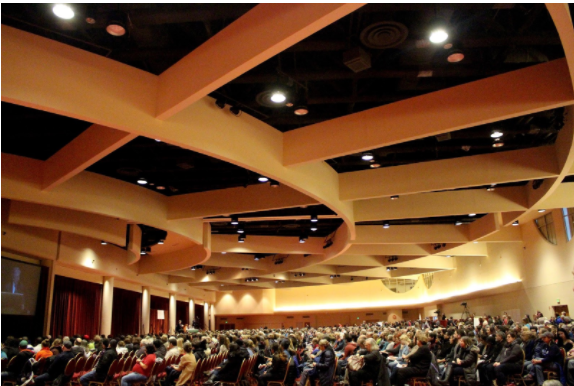






Government officials, community leaders and hundreds of members of the public gathered Sunday for a community forum gathered at the Monona Terrace Convention Center to discuss immigrant rights and related community issues.
Hosted by Alder Samba Baldeh and organized with the Mayor’s Office, Common Council and other community leaders, the Know Your Rights: United We Stand event presented several panels around the issues of constitutional rights, resources and community engagement.
The Monona Terrace prepped for around 1,000 people to attend, but overflow seating opened before the event started and hundreds of others were left to stand in the back or sit on the floor, according to Monona Terrace Executive Director Gregg McManners.
 Madison Mayor Paul Soglin addresses community members gathered at the Monona Terrace Convention Center for a public forum on topics such as immigrants rights and city unity. (Lauren Ann Sklba/Madison Commons)
Madison Mayor Paul Soglin addresses community members gathered at the Monona Terrace Convention Center for a public forum on topics such as immigrants rights and city unity. (Lauren Ann Sklba/Madison Commons)
“You’re setting up a very welcoming spirit in this place,” District 1 Alder Barbara Harrington-McKinney told the crowd as they got settled to start.
Throughout the afternoon, McKinney reminded those in attendance to “be gentle with yourself” and to share their emotions, thoughts and fears.
While the event was intended to be interactive, the forum became primarily informational, largely due to the unexpected turnout.
After a “Call for Peace” from Art Shegonee and remarks from Dane Country Judge Rev. Everett Mitchell, Mayor Paul Soglin began the forum addressing the question, “Is Madison a sanctuary city?”
“If you ask Governor Walker, if you ask Donald Trump, we are a sanctuary city,” Soglin said.
Soglin confirmed Madison law enforcement’s decision to act independently of immigration authorities, joining mayors from across the nation in committing to immigration reform and upholding principles of the Constitution.
Constitutional Rights
Rev. Mitchell moderated the first panel of the afternoon which focused on Constitutional Rights. Speakers spoke primarily in clarification of and in response to Trump’s executive order.
ACLU Director of Youth and Programs Emilio de Torre began the afternoon’s first panel with an overview of Trump’s executive order on immigration.
“We know that the Department of Homeland Security’s extreme vetting sets up government machinery for religious and ethnic discrimination under the pretext of national security,” de Torre told the crowd.
Immigration Attorney Glorily Lopez clarified details about Trump’s executive orders in relation to Immigration and Customs Enforcement (ICE). As Wisconsin is not a border state, Lopez primarily looked at his interior enforcement priorities.
Nino Amato, representing the UN Human Rights Commission, spoke in support of groups targeted by the executive order.
“When, not if, there is a Muslim registry… I’m going to register as a Muslim and a recovering Catholic,” Amato said.
Resources
Moderator Masood Akhtar, entrepreneur and advisor to the Madison Muslim community, then asked the audience to work against divisions. With these remarks, he led the event into the second panel of the afternoon, which focused on community resources.
The second panel included Wisconsin State Rep. Chris Taylor of District 76, Madison Council District 5 Alder Shiva Bidar-Sielaff, Dane County Sheriff Dave Mahoney, and U.S. Attorney for the Western District of Wisconsin John Vaudreuil.
Bidar-Sielaff focused on Madison’s ongoing protection of immigrant communities, mentioning Chief of Police Michael Koval’s role in guiding local law enforcement on this issue.
Mahoney recommitted himself to eliminating prejudice and building relationships between law enforcement and local communities as he continues to serve Madison.
“That’s why I became a law enforcement officer, to ensure that every citizen is protected without regard to their race or religion, their immigration status or their sexual preference,” Mahoney said.
Mahoney also discussed ICE, stating that local law enforcement will not comply with immigration holds and detentions.
Vaudreuil, who was appointed U.S. Attorney under President Barack Obama, will stay in office until his successor is named.
Vaudreuil encouraged the audience to “remedy bad policies at the ballot.” He then expressed his desire to see state policies increase penalties for hate crimes and reassured the crowd of protection under federal civil rights laws, which cannot be changed by executive orders.
Community Engagement
The final panel gave several local community leaders the opportunity to express their concerns and called for audience members to respond with action to the Trump administration.
The panel included representatives from the Madinah Community Center, UW-Madison’s and Madison College’s Muslim Student Associations, the Interfaith Coalition for Worker Justice, the NAACP and the Latino Children and Family Council.
The forum ended with a statement from Haywood Simmons, life coach and former UW-Madison football player, who asked the audience to live out the values of respect and compassion rather than just speaking out about these ideals.
“I ask you today, with Donald Trump as our president and the future uncertain, for us to start practicing more empathy to one another,” Simmons said.
At the intended 5 p.m. end time, audience members were still actively participating in the conversation.
There will be a follow-up event on Feb. 21 at the Central Madison Public Library at 6:30 p.m.
|
|
|
Welcome to the Madison Commons, a website designed to provide news and information about all of Madison's neighborhoods and a crossroads for the discussion of community issues. The name comes from the idea of a village commons, a place for news, talk, debate, and some entertainment, too, that's open to everyone.
All rights reserved. Read more about the Madison Commons and its partners.

